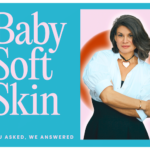Ashley Brissette, MD MSc FRCSC
Ophthalmologist and Founder of Daily Practice
-
You Asked We Answered

Eye health is super important, but we sometimes neglect it. So, we talked with Ashley Brissette, MD MSc FRCSC (she/her), ophthalmologist and founder of eyecare cosmetic company Daily Practice, to discuss myths, facts, and just what to be mindful of when it comes to our 👀. BTW, you can also check out Daily Practice’s IG for vision tips, playlists, gratitude exercises, and more to keep you and your eyes healthy.
Now, let’s see what that eye twitch is about…
First things first: screen time. How long can we stare at our phones/computers/TVs until it starts to damage our eyes?
Using digital devices leads to eye strain, which can cause discomfort, fatigue, and blurry vision. Although less time is better, it can be hard to limit screen time in our digital worlds. I recommend what is called the 20-20-20 rule—taking breaks every 20 minutes and focusing on something at least 20 ft away for at least 20 seconds. Additionally, adjusting the brightness and contrast of your screen, as well as the size and font of the text, can help reduce eye strain. Using anti-glare screens and using artificial tears can also help protect your eyes.
Next: blue light filtering products. Do they really work?
There is no good evidence for blue light blocking glasses. There was a large study that was published a few years back that didn’t show any improvement for eye strain. I usually tell my patients if they try them and think they help, there is no harm in using them as it seems variable if people like them or not. However, don’t spend a ton of money because there isn’t great research to support their use.
Why do eyes twitch?
This is so common! It’s called myokymia and it’s when the eyelid muscle can go into involuntary spasms or twitches which may occur in one or both eyes. The twitching usually lasts for a few seconds or minutes at a time, and can sometimes persist for several days or even weeks. Eyelid myokymia is often caused by stress, fatigue, or too much caffeine. If the twitching spreads down the face or into the neck, that is a sign to see your doctor. Eyelid twitching doesn’t need treatment, but managing underlying factors such as reducing stress, getting enough sleep, and avoiding caffeine may help alleviate symptoms.
Why is it important to get annual eye exams?
Regular eye exams are important for maintaining good eye health and detecting any potential problems early on, before they can cause serious vision loss or other complications. Eye exams can detect eye diseases, as well as other health problems such as diabetes, high blood pressure, and autoimmune diseases. It is recommended that adults have a comprehensive eye exam every two to three years, or more frequently if recommended by their eye doctor based on their individual risk factors and health history. If you are over 60 years old, every one to two years is recommended.
Is 20/20 vision the perf range?
20/20 vision refers to being able to see a certain size letter at 20 ft which is what most people can see. To drive, you have to have 20/50 or better vision. Some people may have better than 20/20 vision, while others may have slightly worse and factors such as age, genetics, and certain health conditions can all affect vision.
Do sunglasses actually protect your eyes?
Sunglasses give protection from UV rays which can lead to cataracts, macular degeneration, and even eye cancers so it’s important to protect the eyes. I recommend sunglasses with 100% UV protection—they don’t have to be a designer brand, as long as they have UV protection.
It seems like eye drops are all over TikTok, especially in content creators’ daily morning routines. Are they necessary for everyday use?
Yes, artificial tears are generally safe to use and can be a helpful way to relieve dry, irritated eyes. Artificial tears are eye drops that are designed to mimic the natural tears that keep the eyes lubricated and healthy. There are also OTC eye drops for allergies which are effective. Preservative-free artificial tears are often recommended for people who use eye drops frequently or have sensitive eyes, as preservatives can sometimes cause irritation or allergy. I recommend Refresh, Systane, Theratears, or Retaine brands.
Something I recommend is washing over the closed eyelids 2x a day as this removes pollen, dust, bacteria, and pollution that builds up and causes eye irritation and redness. Use a cleanser that is safe and formulated for the eye area, like this one.



